Doktorikooli intensiivseminar "Event in Literature, Arts and Life"
2016. aastal uuenenud doktorikoolid pakuvad jätkuvalt põnevat programmi.
Kultuuriteaduste ja kunstide doktorikoolis ootab lisaks jaanuaris toimuvale talvekoolile peatselt ees kõigile huvilistele avatud intensiivseminar pealkirjaga "Event in Literature, Arts, and Life", mis toimub 16.-17. veebruarini. Esimesel päeval räägivad nimekad külalislektorid Belgiast, Norrast ja Prantsusmaalt sündmuste kujutamisest filosoofilises, kognitiivses ja kirjanduslikus võtmes. Teisel päeval on magistrantidel ja doktorantidel võimalus endil kaasa lüüa, osaledes nii grupitöödes kui ka avalikes aruteludes.
Ürituse korraldajateks on maailma keelte ja kultuuride kolledž ning kultuuriteaduste ja kunstide instituut.
Kaasa mõtlema kutsutakse kõiki, keda paelub see teema meie sündmusterohkel ajastul! Ainepunktide saamiseks tuleb end kirja panna ühte temaatilisse töötuppa.
Programm:
Thursday, February 16
Ülikooli 18-139
9.30 Registration
9.45 Opening words
Morning session: moderator prof. Daniele Monticelli (Tallinn University)
10.00 Prof. Stéphane Lojkine (Aix-Marseille), “History after history: from Specters of Marx to The Gift of Death”
11.00 Discussion
11.30 Coffee break
11.45 Prof. Françoise Lavocat (Paris 3), “Event and Natural Catastrophes: construction and deconstruction”
12.45 Discussion
13.15 Lunch (for registered participants)
Afternoon session: moderator prof. Marina Grišakova (University of Tartu)
15.00 Dr. Karin Kukkonen (Oslo), “Reading Literary Narrative: Event and Experience”
16.30 Coffee break
16.45 Prof. Luc Herman (Antwerpen), “Skirting the Event: Evocations of 9/11 in the Work of Thomas Pynchon”
18.15 Discussion summary: prof. Marina Grišakova and prof. Daniele Monticelli
20.00 Dinner (for registered participants)
Friday, February 17
10.00-13.00 Students workshops (Jakobi 2-109, 111, 113, 131)
Workshop 1: Prof. Luc Herman
Workshop 2: Prof. Françoise Lavocat
Workshop 3: Dr. Karin Kukkonen
Workshop 4: Prof. Stéphane Lojkine
13.00 Lunch (for registered participants)
14.00 Students presentations (Jakobi 2-110)
Moderator: Dr. Raili Marling (Univeristy of Tartu)
16.00 Coffee break
16.30 Discussion summary
18.00 Apéritif
Külalislektorid:
Prof. Luc Herman
University of Antwerp (Belgium)
"Skirting the Event: Evocations of 9/11 in the Work of Thomas Pynchon"
Abstract: As the inaugurating event of the twenty-first century in the West, 9/11 still seems to require a combination of respect and grandness from those who wish to imagine it in the public sphere. New York author Thomas Pynchon moves from a short, almost allegorical representation in his novel Against the Day (2006) to a broad and yet distancing treatment of the terrorist attack in Bleeding Edge (2013). This lecture will investigate the fate of Pynchon’s “postmodernism” in the face of his intimidating topic.
Luc Herman is professor of Literature in English and narrative theory at the University of Antwerp (Belgium). His research interests include American postmodernist fiction, ideology and philosophy of literature, cognitive and enactive approaches to narrative. As a prominent Pynchon specialist, he has co-edited The Cambridge Companion to Thomas Pynchon (2012) and co-authored Gravity's Rainbow, Domination, and Freedom (2013). As a narrative theorist, he has co-authored Handbook of Narrative Analysis (2005, second edition expected 2018) and a variety of essays and reviews in such journals as Narrative, Style and Poetics Today. He serves in the executive council of the International Society for the Study of Narrative.
Dr. Karin Kukkonen
University of Oslo (Norway)
“Reading Literary Narrative: Event and Experience"
Abstract: How do we know something is an event? How does telling a story contribute to our understanding of events? How does narrative connect the sharp instantaneousness of the event with the thick texture of experience? We will draw on Alfred North Whitehead's philosophy of process, current neurophenomenology and models of event cognition, as well as more traditional narratology, in order to address these questions and to see what these accounts can contribute to the study of literary narrative.
Karin Kukkonen is Associate Professor of Comparative Literature at the University of Oslo (Norway). Her main research interests lie in cognitive narratology and cognitive literary study. As Balzan Research Fellow at St John's College, University of Oxford (2010-2013), she worked on the neoclassical rules of poetics and the ways in which they engage readers cognitively and emotionally. She has published widely on comics and graphic narrative (Contemporary Comics Storytelling, 2013; Studying Comics and Graphic Novels, 2013) and embodied and probabilistic approaches in cognitive narratology (with articles in Anglia, Style, Paragraph and elsewhere). Her latest monograph, A Prehistory of Cognitive Poetics: Neoclassicism and the Novel, which traces cognitive approaches to literature back to the seventeenth and eighteenth centuries, will appear with Oxford University Press in 2017.
Prof. Françoise Lavocat
University of Paris III – Sorbonne-Nouvelle (France)
“Event and Natural Catastrophes: Construction and Deconstruction"
Abstract: Here is an extract from a song written the same day as the assassination of the Charlie Hebdo cartoonists: 7 January 2015, I have no desire to go to bed /
I prefer to take pen in hand because this evening I am Charlie ... This evening I am writing for you because I don’t know how to draw /
Let 66 million have the same idea / And may their own ink cartridges never be empty /
Let us leave indelible traces so that the future shall know
/ That their talent and their courage lives not only in our memories /
Writers, lyricists, illustrators, graffiti artists / Musicians, poets, painters and sculptors
/ Celebrities, unknowns, professionals and amateurs /
Let us ensure that this momentum will find a posting far beyond Twitter ...
It is up to us to take up our pencils so that their struggle should have a meaning ... But no matter what happens, I have pen in hand because this evening I am Charlie Grand Corps Malade.
For the French rapper Grand Corps Malade the role of the arts is self-evident – all the arts, in concert, are to be mobilized so as to remember, to transmit memories, to themselves take up the fight, to create a point of collective identification, to construct an event – “I have pen in hand because I am Charlie.” It is an entire people, whatever their skills, who are supposed to respond through writing, images, music, sculpture ... Our era does not question what has become the invariable coupling of historical or natural catastrophes (Fukushima and Katrina gave rise to a flood of works) and artistic practices legitimated by the objectives of political engagement or fund-raising. It is this relationship between catastrophes, memory and the arts that I propose to explore by focusing on natural catastrophes, unloved by historians. It is indeed a paradoxical relationship: natural catastrophes are fated to be forgotten and effectively are: events are constructed and deconstructed. But natural catastrophes arouse – in a different fashion depending on the cultural space and the era – multiple artistic responses and memorial enterprises, sometimes of very great magnitude, entailing significant collective investments over a number of years. Moreover it is often in endowing them with intentionality, in associating them with political issues, in cross-referencing them metaphorically with catastrophes of another kind (historical) that one is able to prolong their memory, through the mediation of cultural artifacts. It is in a diachronic and comparative fashion that I propose to ponder on the different modalities in the relationship between natural catastrophes, collective memory and the arts. I hypothesize that there are three different regimes of the historicity and artification of natural catastrophes extending over a long period (fourteenth through the twenty-first centuries). This proposition is based on European and Western history while drawing comparisons with other areas of the world.
Françoise Lavocat is Professor of Comparative Literature at the University of Paris III – Sorbonne-Nouvelle (France) and former President of the French Association of Comparative Literature. She has been a fellow at the Wissenschaftkolleg in Berlin (2014-2015). She primarily researches theories of fiction, including possible worlds theories. This year saw the publication of her comprehensive monograph Fait et fiction – Pour une frontière in which, as the title suggests, the author delves into the possibility and necessity of distinguishing the factual and the fictional on the theoretical, cognitive and ideological level. It is in this context Prof. Françoise Lavocat currently focuses on the remembering of disasters.
Prof. Stéphane Lojkine
Aix-Marseille University (France)
“History After History: From Specters of Marx to the Gift of Death"
Abstract: As any of Derrida’s books, Specters of Marx is not to be read as a treatise, but as a superimposition of ideologically heterogeneous references. This paper will explore three patterns for it. The first one draws the text back to its aesthetic grounding, from The Truth in Painting: aesthetics is what remains after history. The second one seems to prove that Marx’s call to the real and Derrida’s attraction to onto-theology “are not of the same side”: actually, that other side defines the “after history” call of post-modern theory. But there is a third one, the “conjuring scheme”, which leads from the uncanny in Marx’s texts to political action, through an implicit dialogue between Specters of Marx and The Gift of Death. Derrida’s shift from Marx to Patocka, from communist specters to European responsibility and Christian identity could initiate, more than a political withdrawal, an unexpected call back to history after history.
Stéphane Lojkine is Professor of 18th-century French Literature at Aix-Marseille University (France) and the director of CRISIS and CIELAM, interdisciplinary research centres, at the same university. He is also the Vice-President of the Denis Diderot Society and one of the most distinguished Diderot scholars in the world. In addition to his work on the links between 18th-century literature, theatre and painting, Prof. Stéphane Lojkine has also explored 20th-century French political and aesthetic thought and philosophy (Derrida, Foucault, Lacan, Rancière). With Philippe Ortel and Arnaud Rykner he is one of the developers of the theory of operative devices (dispositifs). [/collapsed]
Veebipõhine registreerimine on avatud 3. veebruarini 2017
Kontaktisik:
Liis Tamm
liis.tamm@ut.ee
Korraldajad:
- Tanel Lepsoo, romanistika osakond, Tartu Ülikooli maailma keelte ja kultuuride kolledž
- Marina Grišakova, kirjanduse ja teatriteaduse osakond, Tartu Ülikooli kultuuriteaduste ja kunstide instituut
- Raili Marling, anglistika osakond, Tartu Ülikooli maailma keelte ja kultuuride kolledž
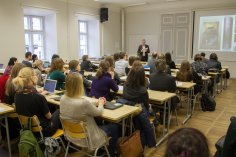
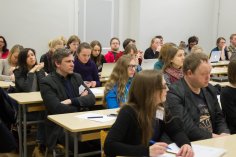
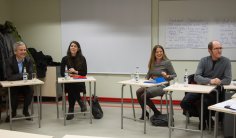
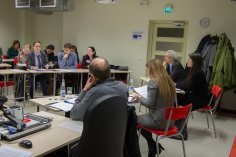
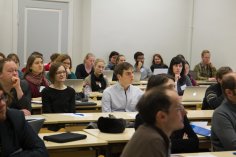
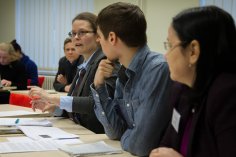
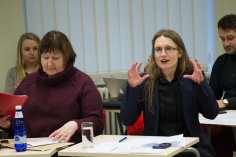
Fotod: Kristi Henno (TÜ multimeedia)
This intensive seminar is organised by the Graduate School of Culture Studies and Arts, financed by the University of Tartu's ASTRA project PER ASPERA, and the Centre of Excellence in Estonian Studies (European Regional Development Fund) and is related to research project PUT1481 (Estonian Research Council, ETAG) as well as the baseline financing project PHVLC16936 (Estonian Ministry of Education and Research) of the University of Tartu.



